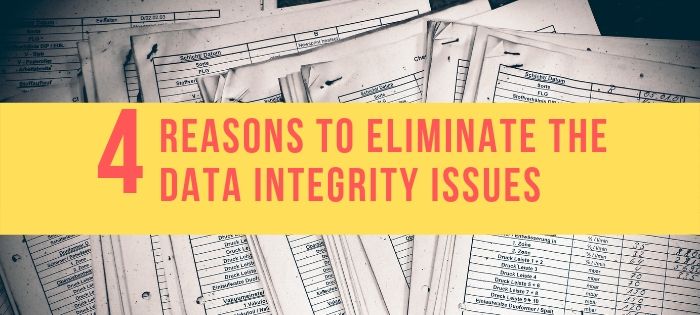
Imagine you attempted to withdraw money from ATM, money is debited from account but actually you didn’t receive any cash from the machine.
Would You accept it? Absolutely Not!
Fate of your decision lies in data accuracy. When you take a decision, it may be a good decision or a bad one. However the same is completely dependent on the accuracy of the data being evaluated by you, same applies to the Management Information System also.
The decision of the management may go wrong in case there is inaccurate data and inadequate Management Information System.
These are the two sides of the same coin, however, they are taught to us in different way.
Now let us take an example:
“Earth is flat”.
Since we can’t see the earth, therefore, it is quite obvious to believe in this statement if we are hearing it for the first time. However, we are quite educated and having gained wisdom, therefore we understand that this statement is not the correct.
Suppose you are not acquired with such wisdom and knowledge, what will happen? Disaster!!
That’s what we call ‘Data Integrity’ in Bio-Pharmaceutical industry. Everyone cannot have all wisdom and knowledge due to the complexity & versatility of the industry structure.
Pharmaceutical and Biopharmaceutical industries must develop the strategies to eliminate the Data Integrity from the Industry for the following possible four reasons:
- To take Adequate Decisions
- To move from Regulator Driven Organization to Self-Driven Organization.
- To Develop Leading Behavior Instead of Lagging Behavior
- To prevent the Organization form the Regulator outburst
To take Adequate Decisions
To understand the significance of the data we must understand that the accuracy of the data leads to the accurate decision and inadequate data will leads to inaccurate decisions.
We must teach ourselves that data is the backbone of CGMP compliance and the fuel of the pharmaceutical Quality & Safety elements.
In the pursuit of increased efficiency, digital approaches are being used for risk reduction and greater innovation in pharmaceutical lifecycle processes—from discovery to commercial manufacturing—and must continue to be further leveraged.
We must develop the systems which creates the periphery of collection of adequate data so that it leads to the adequate decisions.
To Develop Leading Behavior Instead of Lagging Behavior
Focus in to lay emphasis on Leading Behavior and work through proactive should be developed within the team leaders. This will enables organizations in drift from Data Integrity Issues to Data Driven Organization
| Leading Behavior | Lagging Behavior |
| In-process observations Robust Self Inspections Cross-Blocks Inspections Event (Deviation /Incident) Reporting Proactive Compliance to updates | External CAPA Market Complaint Customer Audits Product Recall Regulatory Query |
To move from Regulator Driven Organization to Self-Driven Organization
Drug Manufacturers is regulated by the National and International regulatory bodies to have the drug manufactured under the CGMP compliance and as per the Quality & Safety Standard.
However, there is a need to change this mindset where we need other to control our process and compliances.
This kind of the mindset can’t be adopted easily; however, this needs to be cultivated day after day.
We understand there are so many implications for data integrity; however, we never believe completely that this can be eliminated.
We must understand that the CGMP means compliance with continuous improvement; it does not meet to be adherence to things which are beyond expectation and reality.
To prevent the Organization form the Regulator outburst
For several years, the FDA and other global regulatory bodies have emphasized the importance of accurate and reliable data in assuring drug safety and quality.
As an outcome of the importance of this issue, in April 2016, the FDA released draft guidance, “Data Integrity and Compliance with CGMP Guidance for Industry.” Within the guidance itself, the FDA notes the trend of increasing data integrity violations.
The guidance states, “In recent years, FDA has increasingly observed CGMP violations involving data integrity during CGMP inspections. This is troubling because ensuring data integrity is an important component of industry’s responsibility to ensure the safety, efficacy, and quality of drugs and of FDA’s ability to protect the public health. These data integrity-related CGMP violations have led to numerous regulatory actions, including warning letters, import alerts, and consent decrees.”
The phrase “data integrity” often conjures the image of intended and dishonest manipulation of data to achieve some benefit or avoid negative consequences.
Most of the data integrity violations are not purposeful and are as an outcome of improper training, ineffective SOPs, corrupt systems, or lack of clarity within the regulations themselves. Automation and updation with the time will prevent the data integrity issues.
Conclusion
It is very important that we understand that reasons to come out from Data Integrity issues and start thinking for developing the strategies for the elimination of Data Integrity issues.
The impact of Data Integrity is very huge and it becomes very difficult for the Organization to revive from the regulatory outburst.

Raman is a versatile experienced Bio-pharmaceutical professional with more than 17 year of experience in Sterile and Non-Sterile Formulations. Raman is working in different aspects of Sterile Validations and designing Pharmaceuitcals Quality Systems for the next century. He is a versatile and tech savvy professional who believe the Quality is the foundations of Growing Organizations
Related Article – “5 Myths about Data Integrity” gives insights about the Data Integrity Myths prevailing in the Industry.








